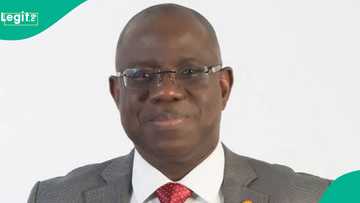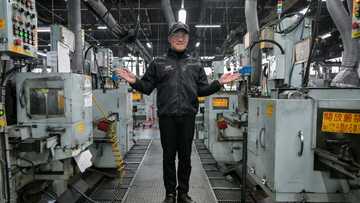Nigerian president sacks board of state oil company

Source: AFP
CHECK OUT: How to Start Earning with Copywriting in Just 7 Days – Even if You’re a Complete Beginner
President Bola Tinubu dismissed the entire leadership of Nigeria's state-run oil company Wednesday, naming a former Shell executive to lead the outfit in a sweeping overhaul that one commentator described as "long overdue".
The National Petroleum Company (NNPC) Limited's group chief executive, Mele Kyari, as well as its chairman Pius Akinyelure -- a close ally of Tinubu -- were among those ousted.
Kyari was immediately replaced by Bayo Ojulari, a former managing director of Shell Nigeria Exploration and Production Company (SNEPCO), a subsidiary of the multinational oil giant.
"The board's restructuring is crucial for enhancing operational efficiency, restoring investor confidence, boosting local content, driving economic growth and advancing gas commercialisation and diversification," Tinubu's media adviser, Bayo Onanuga, said in a statement.
The new leadership is tasked with reviewing strategic partnerships, increasing daily oil output to bridge a revenue shortfall, meeting growing local demand and curbing widespread oil theft.
The NNPC has long struggled with allegations of corruption, political interference and mismanagement of the west African nation's fossil fuels.
The country's oil production slowed to less than a million barrels per day in 2023. However, following a recent turnaround, the government is targeting two million barrels per day by 2027 and three million by 2030.
Amid Nigeria's mix of state and private players, the NNPC is expected to contribute at least 10 percent to the country's daily output by 2027.
A source in the presidency told AFP that Tinubu was concerned about the "crisis of confidence" in the oil industry, which is seen as a key cog in the country's ongoing economic reforms.
But another insider insisted that the dismissals were not an indictment of the previous board.
"There are certain positive reforms that the president wants to achieve in the industry," the source told AFP, while also offering praise for Kyari's role in reviving the company's refineries.
'Long overdue'
Kelvin Emmanuel, an economist and businessman who regularly comments in Nigerian media, told AFP that the sackings were "long overdue", insisting that the oil giant has "grossly underperformed" under the outgoing board.
"The failure of (NNPC) has direct bearing on the economic woes Nigeria has," Emmanuel said.
Despite its massive fossil fuel reserves and decades of oil production, millions of Nigerians live in poverty.
Successive governments have been accused of corruption in the oil sector while foreign fossil fuel giants have polluted large swathes of the country.
Another expert, however, told AFP that Ojulari's appointment does not necessarily "move the needle" given the industry's systemic challenges and perceived political interference.
"The sudden move... might spook investors a little bit," said Ikemesit Effiong, a partner at the Lagos-based risk consultancy SBM Intelligence.
"If every time we have a board, there is a strategic review of NNPC portfolios, that's not a sustainable way to run a company as large as NNPC."
Political, ethnic divides
NNPC's new group chief executive officer Bayo Ojulari recently led a consortium involving Beninese-Gabonese businessman Samuel Dossou-Aworet's Petrolin and four Nigerian oil companies to acquire onshore assets from Shell in Nigeria.
His appointment, however, may provoke a backlash from the opposition, who have accused Tinubu -- a Yoruba Muslim from the country's southwest -- of pursuing an ethnic agenda.
Nigeria is roughly divided between a Christian-majority south and a Muslim-dominated north.
Ojulari is from the north-central region of the country and is a Muslim, but like Tinubu is a member of the southern-dominant Yoruba ethnic group.
Ojulari's appointment "is going to provoke reactions, especially from northern politicians," Effiong told AFP. "That is one of the first challenges the new board will have to navigate."
PAY ATTENTION: Сheck out news that is picked exactly for YOU ➡️ find the “Recommended for you” block on the home page and enjoy!
Source: AFP





